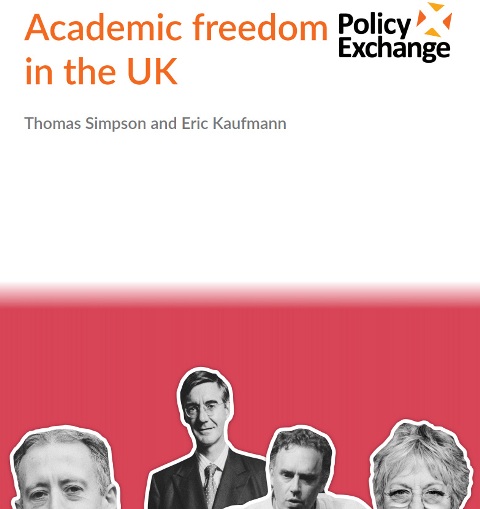 The 'Academic Freedom in the UK' report was published in 2019.
The 'Academic Freedom in the UK' report was published in 2019.
[This is an excerpt from an article appearing in The Round Table: The Commonwealth Journal of International Affairs. Opinions expressed in articles do not reflect the position of the Round Table’s Editorial Board.]
When, in early August, the right-of-centre London think-tank Policy Exchange published evidence that free speech is being suppressed in British universities, Jo O’Grady, secretary-general of the University and Colleges Union (UCU), was quick off the block to dismiss it as “a myth” (Daily Telegraph, August 3). In so saying, she was expressing a view that is now common sense on the left, namely, that the alleged threat to academic freedom is a bogeyman conjured up by beleaguered conservatives.
But the left is wrong, as I know from my own experience. In early December 2017, my wife and I were at Heathrow airport, waiting to board a flight to Nuremberg. Just before setting off for the departure gate, I couldn’t resist checking my email just one last time. My curiosity was aroused when I saw in my inbox a message from the public relations office of the University of Oxford, where I teach. I clicked on it, to discover a notification that my ‘Ethics and Empire’ research project had become the target of an online denunciation by a group of Oxford students calling itself ‘Common Ground’.
Within a week two more virtual denunciations appeared. The first was signed by 58 of my own colleagues and heralded the boycott of my research project by Oxford’s Centre for Global History. The second was organised by an English scholar at the University of Cambridge, who had tweeted that I was a racist and announced of ‘Ethics and Empire’, ‘We must shut this down’. Her denunciation carried the signatures of about two-hundred academics world-wide, attacking Oxford for supporting me.
What had I done to attract all this hostile attention? Three things. In late 2015 and early 2016, I had offered a defence of Cecil Rhodes during the Rhodes Must Fall campaign in Oxford. Then, second, in late November 2017, I published a piece in the Times newspaper, in which I referred approvingly to Bruce Gilley’s controversial article, ‘The Case for Colonialism’, and argued that the British have reason to feel pride as well as shame about their imperial past. And a few days later, third, I finally got around to publishing an online account of the ‘Ethics and Empire’ project, which assumes that empire is a morally mixed phenomenon, good as well as bad, and might sometimes be justified.
Of course, it’s possible that I am completely daft about all these things, but that’s beside the point. The point is whether I should be free to pursue my research without suffering attempts to shut it down by other academics who happen to dislike my moral and political assumptions.
So, my own personal experience is one reason why I know that Jo O’Grady and her allies on the left are wrong to dismiss the threat to academic freedom as a right-wing myth. Another reason is the fact that it’s not only right-wing academics who feel the heat. Left-wing feminists who take issue with the suddenly unquestionable notion that one’s gender is whatever one declares it to be have also found themselves targets of attempts to scare them into silence. Thus, in January 2019 Oxford University had to assign security guards to Professor Selina Todd, a socialist historian, after her criticism of transgender ideology attracted threats of physical violence.
Now, it’s true that my story and Selina Todd’s are just anecdotes, perhaps recording only isolated instances. Yet Policy Exchange’s new report, Academic Freedom in the UK: protecting viewpoint diversity, hardens the evidence that the suppression of political diversity is a problem in British universities. From polling data, it finds that academics on both the left and the right are willing to discriminate on political grounds in making appointments, deciding promotions, and awarding grants. However, since there are far more who lean to the left (over 80%), the overall effect on conservative academics is much greater. Consequently, right-leaning professors tend to perceive their professional environment as more hostile to their political views. This has a ‘chilling’ effect: right-wing academics who are mindful of their careers censor themselves, going into inner exile and keeping their leprous conservative thoughts to themselves.
The threat to academic free-speech is no myth: UK universities do have a problem with unfair discrimination on political grounds, which causes conservative views to be silenced disproportionately. What’s the solution?
Nigel Biggar, Moral and Pastoral Theology, Board of the Free Speech Union, University of Oxford , Oxford, UK.



